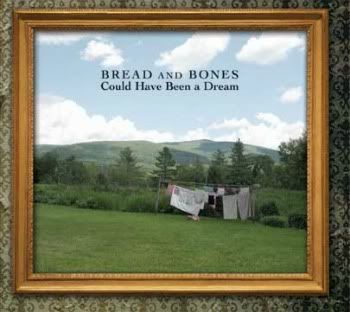
[purchase]
In Bread and Bones, the whole is greater than the sum of some very good parts. The group is a trio, with Beth Duquette on lead and harmony vocals only, Mitch Barron providing subtle support that is always right on a variety of basses, and Richard Ruane on lead instruments and lead and harmony vocals. Ruane wrote all of the original songs here, but when Duquette takes lead vocals, she inhabits her narrators so completely that it’s hard to believe that they were created by a man. I don’t think it was intentional, especially since the original songs were written over the course of nine years, but Could Have Been a Dream winds up being a set of songs about physical, emotional, and spiritual dislocation. I think the sequencing of the songs was probably intuitive, because Ruane is an intuitive songwriter, but the intuition was dead on, and the album winds up making an eloquent and powerful statement.
What you hear on this album is Ruane’s playing, and Ruane and Duquette’s voices. Barron’s bass parts do not announce themselves, but they add texture and enhance the emotion of the songs. Ruane usually plays acoustic guitar, but sometimes he switches to mandolin, ukulele, or even banjo on one song. That song, Emily Sits By the Window, is the one time I heard instrumental overdubs, with Ruane playing banjo, guitar and mandolin. But mostly, the songs sound they way they would live. There are no lead parts on the instruments; every thing is in support of the vocals. The group does show their prowess instrumentally in the way they vary the textures from song to song. Ruane sings in a range that straddles the line between baritone and low tenor. He rumbles a bit on the low notes, but he knows how to use that to his advantage. He has a folk style, direct and full of feeling, without much ornamentation. Duquette sings in a bluesy alto, and I have the feeling she could really belt one out if it suited the material. But the two of them blend masterfully, with their different styles meeting in the middle, and always in service of the song.
Ruane’s songs are about moments captured. There isn’t much storytelling here, although what happens in these moments sometimes tells a story of a kind. So the song Could Have Been a Dream presents a woman who remembers the mother who gave her up into fosterage when she was two or three years old. She has a collection of scattered impressions, filtered through the awareness of a young child, and her one clear memory is the refrain of a lullaby her mother sang to her. The song hints at why the mother had to give her up, but a child that age could never have understood all of the details, so the narrator of the song doesn’t either. It’s a great piece of writing that really hits home. You can tell, listening to Emily Sits By the Window, that this is an older woman; her memories come to her as she watches the sky outside, and then slip away again. We end up knowing some details of her life, but we can’t put her full story together, and we don’t need to. In the Air has a narrator who is probably a trapeze artist in a carnival. The song is about working at love without a net, and the metaphor works that much better because Ruane does not press the point. These are some of the songs of emotional dislocation. Physical dislocation is described best in North Along the River. Here we meet a group of fugitives who can not settle down, or even move about in daylight. The song does not say why they are fugitives; it simply and eloquently describes the rootlessness they feel. Will I Be Welcome and Breakwater are both about the idea of home. Welcome has a narrator wondering if he still has a home, while Breakwater tells of a man who knows he will always be able to find his home again. Who Do You Think It Was is a cover of a Charlie Sohmer tune, and finds a man in the midst of a test of his spiritual beliefs. The song has a gospel feel to it, with a great vocal blend. The album concludes with No Angels. This one says that we as human beings must rely upon ourselves and our intelligence, not on a higher power. It is a fitting conclusion to the journey this album has taken us on, and it feels in context like a message of hard-won hope.
I have nothing against flashy playing, but Bread and Bones don’t feel that they have to prove anything like that on this album. Could Have Been a Dream is a collection of finely written songs, with wonderful vocal performances, and solid instrumental backing to put the whole over with eloquence and grace.
Bread and Bones: Could Have Been a Deam
Bread and Bones: Emily Sits By the Window






1 comments:
Lovely work and review. Thanks for steering me to their work.
Post a Comment